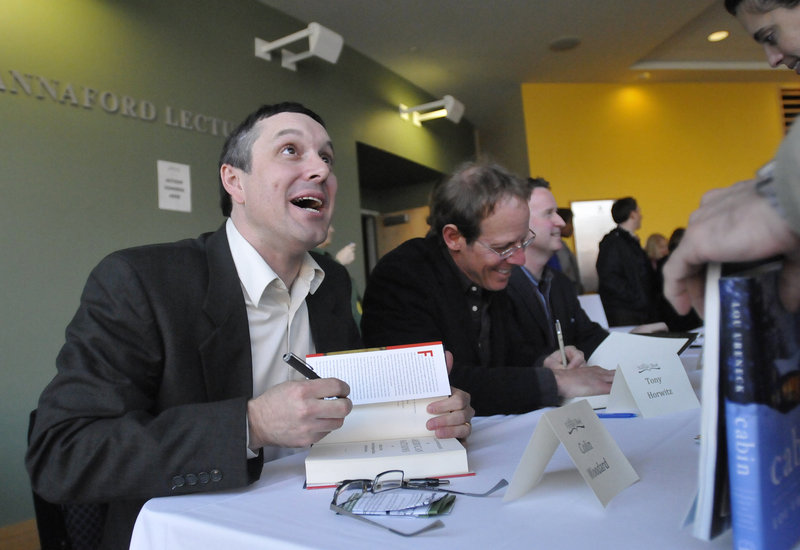PORTLAND — Writer Michael Willrich said the idea for his critically acclaimed book, “Pox: An American History,” came from a single Supreme Court case that upheld the states’ compulsory vaccination laws adopted at the beginning of the 20th century.
But Willrich’s research revealed a much more dramatic nationwide story, involving vaccination squads that would arrive in the middle of the night to tear sick babies away from their mothers.
Triggered by a late-19th century smallpox epidemic in America, compulsory vaccination also sparked a major civil liberties battle that parallels similar issues raised by the war on terrorism and the individual health insurance mandates under the Affordable Care Act, Willrich said.
“I could not have anticipated that vaccination was so controversial,” said Willrich.
Willrich was one of three history writers, including Pulitzer Prize-winning Tony Horowitz and Maine writer Colin Woodard, who kept a packed auditorium of book lovers in their seats with a discussion about the art of historical writing at the Maine Festival of the Book at the Abromson Center at the University of Southern Maine.
In its sixth year, the four-day festival draws thousands of readers and writers from across the country to hear panel discussions and readings, collect author’s signatures and attend poetry slams. The celebration is almost entirely free.
It is organized by Maine Reads, which promotes literacy and Maine’s literary heritage. The festival continues today with more events on the USM campus. A complete schedule of events is available online at www.mainereads.org.
Sarah Cecil, executive director of Maine Reads, said she is always surprised and grateful by how many writers agree to participate in the festival. They are not paid. But book festivals are becoming increasingly important in the marketing of books, Cecil said.
“Publishers like them and authors like them,” she said.
Many of the attendees said they were veterans of the Maine Festival of the Book.
Kathy George and Darcel Devou, both librarians at the Gray Public Library, said this was their third year at the festival.
“This is a great way to get author visits (to the library) and it is free,” said George.
Attendees said picking which panel discussion to attend was a tough decision.
“I have a conflict between this and Martha White,” said Paul Kiley of Portland, who was waiting for the history writers’ discussion.
White, a writer and granddaughter and literary executor of E.B. White, was due to present favorite quotes, photos and home movies of her grandfather.
Back at the history panel, all three authors said the digital age had transformed historical research. What would take teams of researchers weeks to uncover in historical archives can now be discovered with a few clicks of a mouse and a search engine. Every week more material is converted to digital form, the authors said.
“I almost have too much material, ” said Horowitz, author of “Midnight Rising,” about abolitionist John Brown.
But there is a big downside, the authors agreed. The information age has fueled a tendency to leave no written records behind, lest they come back to haunt whoever left them, said Woodard. Email has basically meant the end of the written letter, a treasure trove for historical researchers.
“I do worry about this,” said Willrich.
Staff Writer Beth Quimby can be contacted at 791-6363 or at:
bquimby@pressherald.com
Copy the Story Link
Send questions/comments to the editors.




Success. Please wait for the page to reload. If the page does not reload within 5 seconds, please refresh the page.
Enter your email and password to access comments.
Hi, to comment on stories you must . This profile is in addition to your subscription and website login.
Already have a commenting profile? .
Invalid username/password.
Please check your email to confirm and complete your registration.
Only subscribers are eligible to post comments. Please subscribe or login first for digital access. Here’s why.
Use the form below to reset your password. When you've submitted your account email, we will send an email with a reset code.